Pope prays at Israel's West Bank separation barrier
- Published
The Pope rested his head against Israel's separation barrier as he prayed
Pope Francis has prayed at the concrete barrier Israel is building in and around the West Bank during his three-day tour of the Middle East.
The unscheduled stop came after he called for an end to the "increasingly unacceptable" Palestinian-Israeli conflict.
Speaking in Bethlehem, the Pope invited the Israeli and Palestinian presidents to the Vatican to pray for peace.
The tour's official purpose is to improve ties with the Orthodox Church.
The Pope is to meet Bartholomew I, the Orthodox Patriarch of Constantinople, in Jerusalem later - to commemorate the 50th anniversary of a historic meeting of Catholic and Orthodox leaders who moved to end 900 years of division between the two churches.
Francis's visit comes just weeks after peace talks between Israel and the Palestinians broke down, and his invitation to Rome for Presidents Peres and Abbas - quickly welcomed by both - is an intriguing development, says BBC Middle East Editor Jeremy Bowen.
Following the Mass in Bethlehem, the Pope flew by helicopter to Tel Aviv where he was formally welcomed to Israel by President Shimon Peres and Prime Minister Benjamin Netanyahu.

The BBC's Jeremy Bowen was with the Pope as he arrived at the Dheisheh refugee camp
Jeremy Bowen, BBC News, Bethlehem
This has turned into a much better than expected visit for the Palestinians, according to a PLO official I spoke to here in Bethlehem.
Palestinians have used social media to post pictures of Pope Francis praying at the 8m concrete wall that separates Bethlehem from Jerusalem. The Israelis say the wall and other parts of the separation barrier are vital for the security of their people. But for Palestinians the wall is tangible symbol of what they say is Israel's intention to grab as much land as possible.
The invitation to Rome for President Peres of Israel and the Palestinian President Mahmoud Abbas is an intriguing development, at a time when negotiations have collapsed. The Pope's spokesman said it was a papal peace initiative, based on the Pope's moral and spiritual authority.

"The time has come to put an end to this situation which has become increasingly unacceptable," the Pope said on Sunday as he met Palestinian leader Mahmoud Abbas.
He talked of the "tragic consequences of the protracted conflict" and the need "to intensify efforts and initiatives" to create a stable peace - based on a two-state solution.
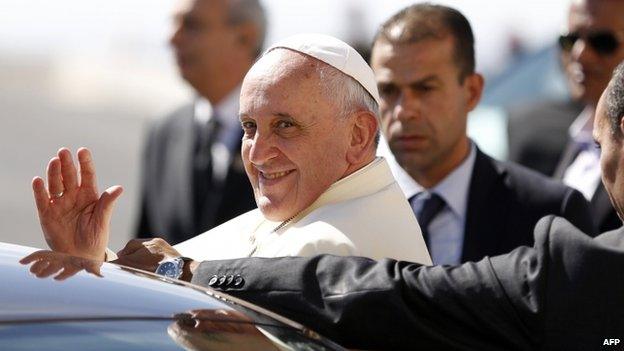
The Pope travelled directly to the West Bank rather than enter via Israel
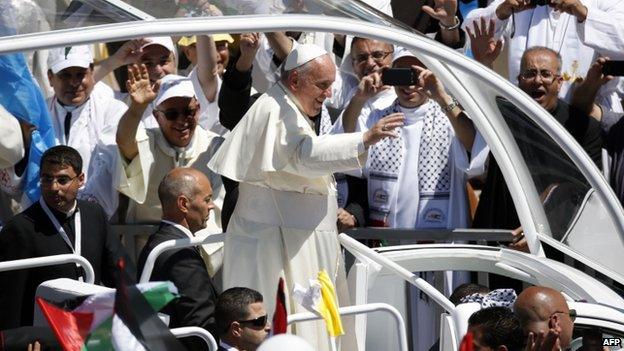
He waved to the crowds as he travelled to Manger Square where went on to hold an open-air Mass
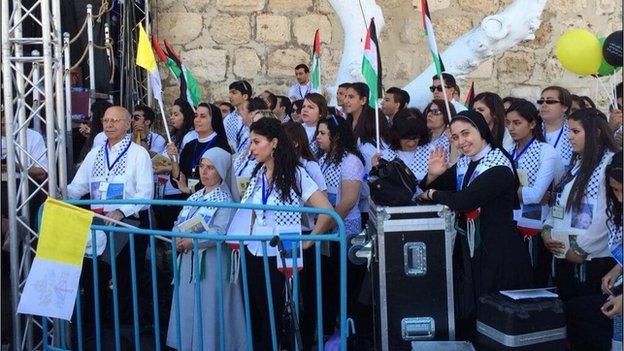
The Pope's arrival was eagerly awaited by local Christians
He later held an open-air Mass for 8,000 local Christians by Bethlehem's Church of the Nativity, during which he said he wished to invite Mr Abbas and Mr Peres to join him at the Vatican "in heartfelt prayer to God for the gift of peace".
The Pope's spokesman, Federico Lombardi, told the BBC the move was papal peace initiative and believed to be the first of its kind.
Pope Francis has insisted the purpose of his Middle East trip is purely religious, but his first speech on his arrival in Bethlehem showed he is also willing to address pressing political issues, correspondents say.
On his way to Bethlehem, he stopped to pray at an 8m concrete wall that is part of the barrier Israel is building in and around the West Bank.
The Pope rested his head against the wall - which Israel says is needed for security, but the Palestinians see as a land grab - near graffiti reading: "Free Palestine."
Palestinian officials have noted that Pope Francis is the first pontiff to travel directly to the West Bank rather than enter via Israel: Many Palestinians see that as a recognition of their push for full statehood.
Papal precedents
Israel has issued restraining orders against several Jewish right-wing activists this week over concerns that they could try to disrupt the visit.
Twenty-six people were arrested overnight for throwing stones and bottles at police during a protest at a holy site on Mount Zion, reports say.
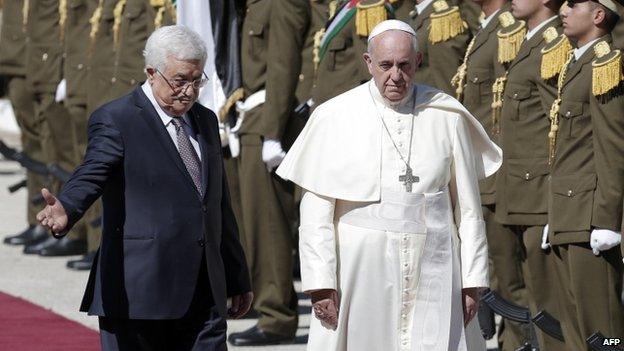
Palestinian leader Mahmoud Abbas received the Pope at his palace
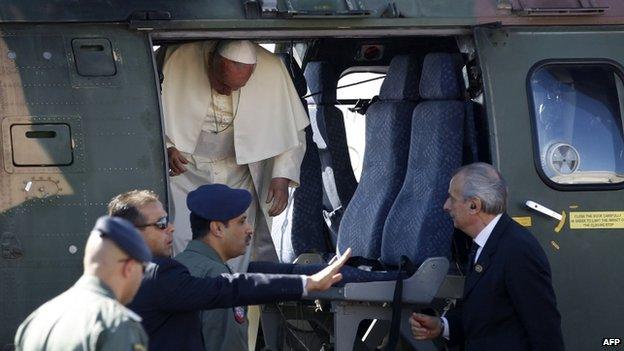
The pope flew straight from Jordan to the West Bank by helicopter
The Pope's tour began on Saturday with a visit to Jordan.
On Monday he is due to visit the al-Aqsa mosque complex in Jerusalem's Old City followed by the Dome of the Rock and the Western Wall.
Pope Francis will be the fourth leader of the modern Roman Catholic Church to visit Jerusalem, after Popes Paul VI, John Paul II and Benedict XVI, who went there in 2009.